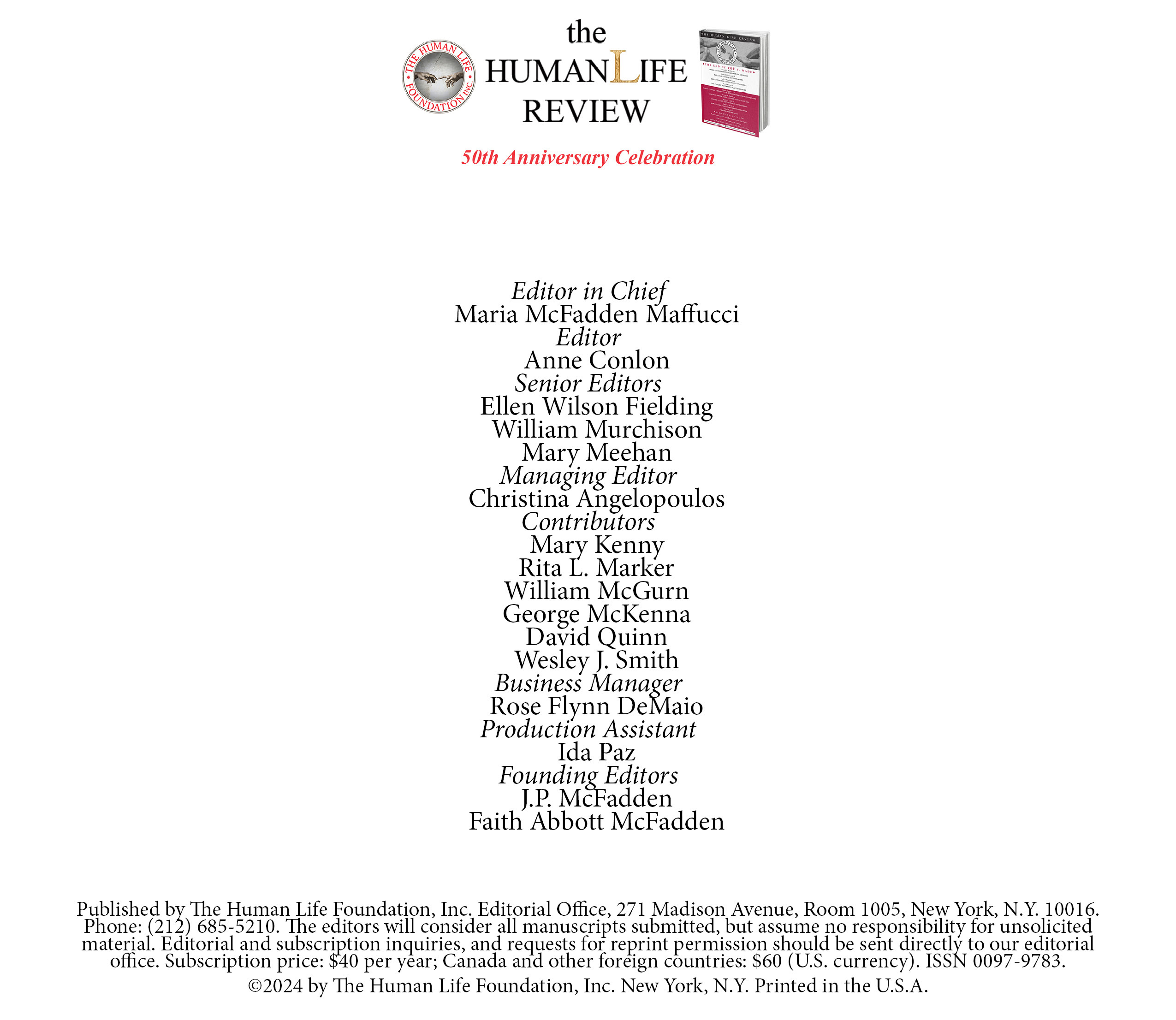|
|
 - About this issue . . .
. . . Abortion: Is there any issue more unsettled in America today? Daily headlines burst with stories on contested state laws, furious skirmishes in bipartisan political battles, looming Supreme Court decisions. Most disturbing, writes senior editor William Murchison in his lead essay (“IVF: The Next Battlefield,” p.5), is that underneath it all is “an atmosphere of profound moral unsettlement.” Gone are the shared moral understandings that used to guide us; we now decide for ourselves what life is, what a person is, the very meaning of existence. We more or less live in “Herr Nietzche’s ‘Beyond Good and Evil,’” says Murchison, where “truth is what your neighbor claims it to be, instead of what many once learned growing up.”
In several states, including New York, activists are working to enshrine abortion in state constitutions, creating a nation of “mini-Roes.” For an excellent analysis of the post-Dobbs landscape, see our interview with legal expert Paul Benjamin Linton (p. 59). In our home state of New York, voters in November will say yay or nay to a vaguely worded, revised Equal Rights Amendment, which, if passed, would not only cement abortion in the state constitution but would seriously threaten parental rights and religious liberty—so writes newcomer to the Review Donald P. Berens, Jr., a retired attorney and former New York State government lawyer. We have (on p. 66) a deft summary of an encompassing and fully cited legal analysis by Mr. Berens now on our website. He expertly lays out the damage such an amendment could do. And for some historical perspective, see Appendix A’s “Letter to the Women’s Lobby,” in which the late, great Clare Boothe Luce writes that the ERA she’d spent decades advocating for–for women–was being crippled by the abortion lobby’s efforts to include the “unnatural act of induced abortion” as a legal, moral and natural “right”–and this was in 1978! (Plus ça change …)
We are pleased to welcome Mr. Berens to this issue along with several other new contributors. Karl Stephan, a professor of engineering at Texas State University, writes in “A Pro-Abortion Epiphany” that coverage of the Kate Cox abortion story involved some pretty twisted theology from a Christian cleric. (Prolifers as Herod? You have to read this to believe it.). Leonard F. Grant III, assistant professor of writing and rhetoric at Syracuse University, gives us an important new way to think about and study post-abortion grief and regret, which is painfully real to many women, despite the promulgated myth that such psychological damage does not exist. Raymond B. Marcin, professor emeritus at Catholic University, articulates clearly what the Dobbs decision did not do—declare the unborn child a person under the Constitution—and gives us a novel possible strategy for the way forward. Finally, young (teen) writer Isabelle Flood reviews the movie Waitress: The Musical, revealing a surprisingly strong pro-motherhood message.
There is so much more in these pages—turn to editor Anne Conlon’s introduction as your expert guide. As we mark our 50th anniversary year, we continue to work to “talk back,” as Murchison puts it, to those Nietzcheans and moral relativists who pretend human life is only worth protecting when convenient. Thank you as always to Nick Downes for helping us stay hopeful by remembering that laughter is, in that great phrase by the late sociologist Peter Berger, a “rumor of angels.”
Maria McFadden Maffucci
Editor in Chief
- “The problems of our world,” says William Murchison, “have edges, angles, pull-outs, protrusions, and rusty nails sticking out everywhere.” In “IVF: The Next Battlefield,” our senior editor ponders the Alabama Supreme Court’s “out-of-nowhere” pronouncement last February that disembodied embryos were children— a startling reminder that a million frozen souls reside in storage tanks across the United States. “No conversation on IVF itself,” Murchison grants, “can be easy.” But “the urgency of moral conversation grows and grows and grows.” Because not only is there the fate of all those neglected “spares” to consider—and who decides what will happen to them, politicians?—but also IVF’s unchecked progress from basic baby-making to “tailoring the product for higher satisfaction,” that is, eugenic baby design.
“Moral discourse about large matters evades us,” Murchison contends, “due to our aching lack of moral leadership.” Case in point: Reverend Katheryn Barlow Williams of Central Presbyterian Church in Austin, Texas, a religious leader “of a certain stripe,” writes Karl D. Stephan in “A Pro-Abortion Epiphany,” who works “pro-abortion messages into the church calendar.” In an opinion piece for a local paper, she offered “a modern-day retelling of the flight of the Holy Family into Egypt,” casting state attorney general Ken Paxton as Herod—no kidding— because he was seeking “to kill the ‘love’ that would allow Kate Cox to abort her baby.” Stephan is not unsympathetic: “[Cox’s] plight of carrying an almost certainly doomed baby was agonizing,” he writes, but pace the irreverent reverend, Texas abortion law “implicitly recognizes that even deformed fetuses are made in the image of God.”
Read More
|
